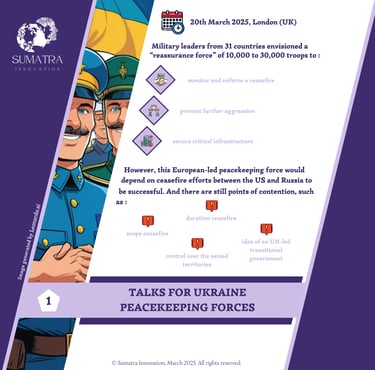Euroscope / March 2025



1/ Talks for Ukraine Peacekeeping Forces
The “Coalition of the Willing”, formed since the London Summit on Ukraine under the leadership of the UK and France, has grown from 16 to over 30 countries to discuss military planning and troop commitments for Ukraine, reflecting the need for Europe to take a more prominent role in securing regional stability. Military leaders from 31 countries envisioned a “reassurance force” of 10,000 to 30,000 troops to monitor and enforce a ceasefire, prevent further aggression and secure critical infrastructure. Among the supporters, Australia, Canada, Japan and New Zealand have expressed their willingness to participate. It is even conceivable that China could take part in the peacekeeping mission. However, this European-led peacekeeping force would depend on ceasefire efforts between the US and Russia to be successful. And, there are still points of contention, such as the scope and duration of the ceasefire, sanctions relief and economic conditions or control over the seized territories. Another issue is the idea of an UN-led transitional government, for which Putin would like to place Ukraine under an external leadership led by the United Nations in order to enable democratic elections and establish a legitimate government.
2/ DMA in action: US tech giants get fined
The Commission remains firmly engaged in enforcing the Digital Markets Act, an EU legal framework designed to promote fair competition and protect consumers in the digital sector. Following investigations and warnings, Apple and Meta now face fines for breaches of the law. While Apple imposes restrictions on app developers that prohibit them from informing users of external purchasing options and charging high commissions for in-app purchases, Meta is under scrutiny for its “pay-or-consent” model (i.e. the method that requires either consent to data tracking for targeted advertising or payment for an ad-free experience). However, the fines are likely to be less severe than originally expected, after US President Donald Trump criticized European regulatory measures against American tech companies, calling them unfair. As he has hinted at possible retaliatory tariffs and the EU wants to avoid escalating tensions, the fines, which can amount to up to 10% of a company's global annual turnover, will be reduced to mitigate the risk of a transatlantic trade conflict.
3/ Selection of 47 Strategic Projects for EU critical raw materials
In line with the implementation of the Critical Raw Materials Act (CRMA), which sets a target for the EU to extract 10% of its strategic raw materials needs, process 40% and recycle 25% by 2030, 47 strategic projects have been approved in 13 EU Member States, covering 14 of the 17 strategic raw materials identified. The strategic projects have three main objectives: to diversify supply to reduce dependency on non-EU countries (1), to achieve sustainability through extraction, processing and recycling using environmentally sound processes (2), and to promote economic growth by boosting local economies. The projects are focused on three main axes: extraction (25), focusing on mining operations to develop domestic reserves of key materials; processing (24), aiming to build facilities that can convert raw materials into forms usable by various industries; and recycling (10), developing technologies and infrastructure to recover valuable materials from waste products. For the selected projects, the Commission, Member States and financial institutions will provide an initial investment of EUR 22.5 billion. It has been promised that the approval procedures will take no longer than 27 months and the other projects no longer than 15 months, in contrast to today's duration taking five to 10 years.
4/ A €1.3B investment for AI, cybersecurity and digital skills
With the adoption of the “Digital Europe” (DIGITAL) work program for the period 2025 to 2027, the goal for the next two years will be to strengthen Europe's technological sovereignty and drive its digital transformation forward. Accordingly, investments of EUR 1.3 billion will be made available for the use of AI and its adoption by companies and public administration, cloud and data, cyber resilience and digital skills. Investments will focus on priorities such as the AI Factory Initiative (developing AI models tailored for use in businesses and the public sector), the EU Cybersecurity Reserve (improving the resilience and security of critical infrastructure), the Destination Earth initiative (building a digital model of the Earth to support climate adaptation and disaster risk management), or the European Digital Innovation Hubs (EDIH) (providing private and public actors with access to technical expertise to test new digital applications and support the uptake of cutting-edge technologies). The next calls for proposals under DIGITAL are expected to be launched in April 2025, with further calls to follow later in the year.
5/ Albanian migration centers turned into repatriation hubs
Italian Prime Minister Giorgia Meloni's cabinet has passed a decree to transform migration centers in Albania into repatriation hubs. These centers were created after Italy and Albania reached an agreement in November 2023 with the aim of easing the burden on Italy's national facilities and speeding up asylum procedures. The decree allows Albanian centers, staffed by Italian personnel and operating under Italian jurisdiction, with Albania providing external security, to be used not only for the initial processing of asylum applications, but also for the detention of migrants who have been issued with expulsion orders, in line with EU efforts to improve the security of repatriations. A key provision concerns the bypassing of judicial obstacles that previously hindered the transfer of migrants to Albania, allowing the Italian government to designate entire countries as safe for the return of migrants. However, Italian courts have already challenged the detention of migrants in these centers, arguing that it could violate migrants' rights and international asylum standards. They have therefore taken the case to the European Court of Justice, whose decision should be announced in the coming weeks.




